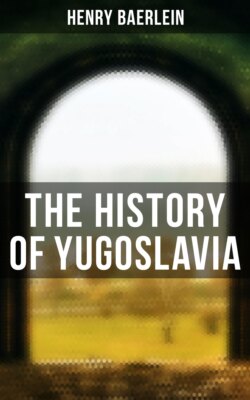Читать книгу The History of Yugoslavia - Henry Baerlein - Страница 74
На сайте Литреса книга снята с продажи.
AUSTRIA POURS OUT A GERMAN FLOOD
ОглавлениеNow that the Austrians had escaped from all their perils, and Napoleon's coup d'état had removed the danger of another revolution in France, they took in hand the burying of the recent Constitution which had given so much umbrage to the Magyars and to the Croats no vast pleasure. In its place, in 1851, the policy of Bach, an absolutist and a German policy, was introduced. The Croats and the Serbs of southern Hungary were treated differently, the latter being given not the territory they had claimed but one much more extensive, so that they themselves were in a great minority.[42] The Croats found themselves, of course, no longer joined to the Dalmatians. Everywhere a flood of Germans, the "huzzars of Bach," was loosened on the population; German was erected to be the official language. But the Slovenes took advantage even of the German atmosphere. Their national consciousness, which Napoleon had awakened after centuries, was now aroused. They took small interest, as yet, in politics, but strove to make material progress, principally in agriculture, partly too in commerce, such as in the exploitation of their splendid forests. Like the Slavs of Istria, they had no educated class—except the clergy—which was strong enough and was sufficiently well organized to lead them. Consequently it was difficult to make much headway in the towns against the Germans here and the Italians there. But they were not discouraged; by means of organizations, political and economic, they fought this denationalizing effect of the towns. That they succeeded in arresting the tendency—for example at Gorica and Triest—is even more laudable in view of the serious educational handicap which for years they had to face, and which the Austrians continued to inflict upon them until 1914. The provincial administration of Carinthia, for instance, was in 1914 maintaining three Slovene schools and six hundred and twelve German schools, although the Slovenes formed one-third of the population. What the Austrians said was that German was a world-language and that it was a fad to want to learn Slovene. Perhaps the Slovenes told them that Welsh is not a world-language. Anyhow, being not only a patriotic but a very practical race, they built their own schools in the villages, with the result that they have to-day a far smaller proportion of illiterates—17–½ per cent.—than either the Croats or the Serbs. It was well that they were patriotic and practical; they would otherwise have reaped a bitter harvest. The Slavs of Istria, Croatia and Dalmatia were in contact with no German territories and were for that reason left in the cold shades. The Slovenes, having Germans near them and among them, had to have a share in what the Germans were enjoying and they reaped sagaciously. One must admit that it was practical on Austria's part to favour the Italian language in Dalmatia, for it was from there that she supplied herself with functionaries for the provinces of Lombardy and Venice.
